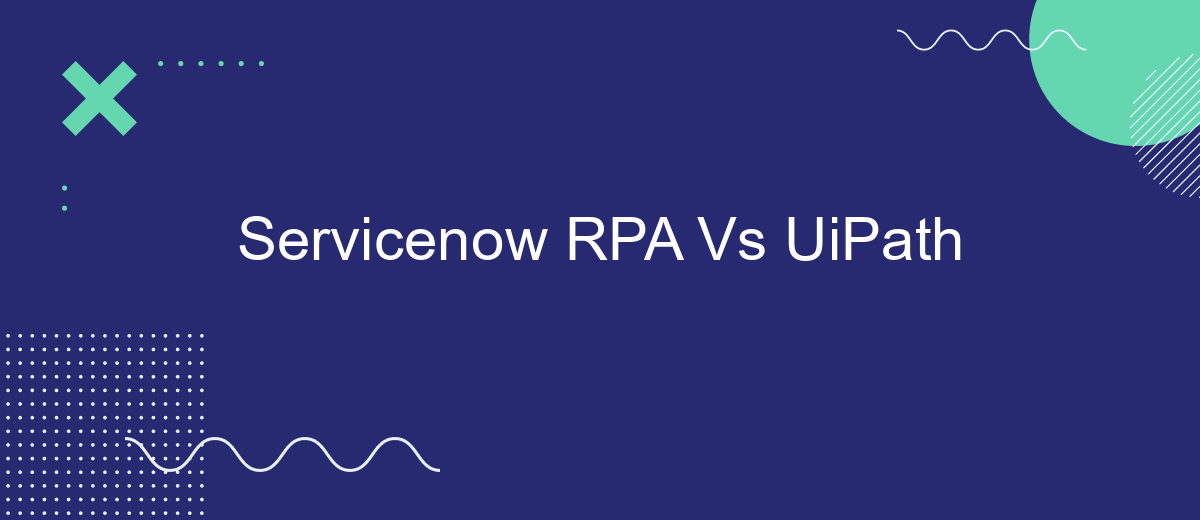In the rapidly evolving landscape of automation, choosing the right Robotic Process Automation (RPA) tool is crucial for maximizing efficiency and productivity. ServiceNow RPA and UiPath are two leading contenders in this space, each offering unique features and capabilities. This article delves into a comparative analysis of these two platforms, helping you make an informed decision for your automation needs.
Introduction
In the rapidly evolving landscape of robotic process automation (RPA), two prominent platforms stand out: ServiceNow RPA and UiPath. These platforms offer robust solutions for automating repetitive tasks, enhancing productivity, and streamlining business processes. Both have unique features and capabilities that cater to different organizational needs.
- ServiceNow RPA integrates seamlessly with the ServiceNow ecosystem, providing a unified platform for IT service management and automation.
- UiPath is renowned for its user-friendly interface and extensive library of pre-built automation templates, making it accessible for both technical and non-technical users.
- ServiceNow RPA focuses on enterprise-level automation with strong governance and compliance features.
- UiPath offers a wide range of integrations with third-party applications, including SaveMyLeads, which simplifies the process of connecting various services and automating workflows.
Choosing between ServiceNow RPA and UiPath depends on various factors such as the specific requirements of your organization, existing infrastructure, and the level of customization needed. This comparison aims to provide a comprehensive overview to help you make an informed decision.
Core Capabilities Comparison

ServiceNow RPA and UiPath are two prominent players in the robotic process automation (RPA) market, each offering a unique set of core capabilities. ServiceNow RPA excels in its seamless integration with the ServiceNow platform, providing a unified environment for IT service management, operations, and business management. This integration allows users to automate workflows directly within the ServiceNow ecosystem, ensuring a consistent and efficient user experience. Additionally, ServiceNow RPA offers robust analytics and reporting tools, enabling organizations to monitor and optimize their automation processes effectively.
On the other hand, UiPath is renowned for its extensive library of pre-built automation components and its user-friendly interface, which caters to both technical and non-technical users. UiPath's strong focus on AI and machine learning capabilities enhances its ability to handle complex tasks, such as natural language processing and image recognition. Furthermore, UiPath boasts a wide range of integration options, including services like SaveMyLeads, which facilitate the seamless connection of various applications and data sources. This flexibility makes UiPath a versatile choice for organizations looking to implement comprehensive automation solutions across diverse environments.
Pricing and Licensing Comparison

When comparing the pricing and licensing of ServiceNow RPA and UiPath, it is important to consider the different structures and options each platform offers. Both platforms provide flexible pricing models to cater to various business needs, but they differ in their approach and inclusivity of features.
- ServiceNow RPA: ServiceNow offers a subscription-based pricing model that includes different tiers based on the number of bots and the level of service required. The pricing is often bundled with other ServiceNow IT service management products, providing a more integrated solution for enterprises.
- UiPath: UiPath offers a more modular pricing structure, allowing businesses to pay for only the specific RPA components they need. UiPath provides licenses for attended and unattended robots, as well as additional options for orchestrators and AI capabilities. This allows for more granular control over costs and scalability.
Ultimately, the choice between ServiceNow RPA and UiPath will depend on your organization's specific requirements and budget. For seamless integration and automation, tools like SaveMyLeads can be utilized to connect various applications and streamline workflows, enhancing the overall efficiency of your RPA implementation.
Use Cases and Industry Focus

ServiceNow RPA and UiPath are both powerful tools designed to automate repetitive tasks and streamline workflows. ServiceNow RPA focuses on enterprise-wide automation, particularly within IT service management, while UiPath excels in offering a versatile automation platform that spans various industries.
ServiceNow RPA is often utilized in sectors that require robust IT operations and service management, such as healthcare, finance, and telecommunications. On the other hand, UiPath is widely adopted across industries like manufacturing, retail, and customer service due to its flexibility and extensive range of pre-built automation components.
- Healthcare: Automating patient data management and appointment scheduling
- Finance: Streamlining invoice processing and compliance reporting
- Telecommunications: Enhancing customer support and network management
- Manufacturing: Optimizing supply chain and production line processes
- Retail: Improving inventory management and customer service operations
Both platforms offer integration capabilities to connect with various third-party services and applications. For instance, SaveMyLeads can be integrated to automate lead management tasks, ensuring seamless data transfer between marketing tools and CRMs. This enhances the overall efficiency and effectiveness of automation workflows within any industry.
Conclusion
In conclusion, both ServiceNow RPA and UiPath offer robust solutions for automating business processes, each with its unique strengths. ServiceNow RPA excels in seamless integration with the ServiceNow platform, making it an ideal choice for organizations already leveraging ServiceNow for IT service management and business workflows. On the other hand, UiPath provides a more flexible and comprehensive RPA solution with extensive capabilities for various industries and use cases.
When deciding between the two, organizations should consider their existing infrastructure, specific automation needs, and long-term goals. For those looking to enhance integration capabilities, tools like SaveMyLeads can further streamline the process by automating the data flow between different applications, ensuring a more efficient and cohesive automation strategy. Ultimately, the choice between ServiceNow RPA and UiPath will depend on the unique requirements and strategic objectives of the business.


FAQ
What are the main differences between ServiceNow RPA and UiPath?
Which platform is more user-friendly for beginners?
Can ServiceNow RPA and UiPath be integrated with other applications?
Which platform offers better scalability for large enterprises?
How can businesses implement automation if they lack in-house expertise?
Personalized responses to new clients from Facebook/Instagram. Receiving data on new orders in real time. Prompt delivery of information to all employees who are involved in lead processing. All this can be done automatically. With the SaveMyLeads service, you will be able to easily create integrations for Facebook Lead Ads and implement automation. Set up the integration once and let it do the chores every day.
